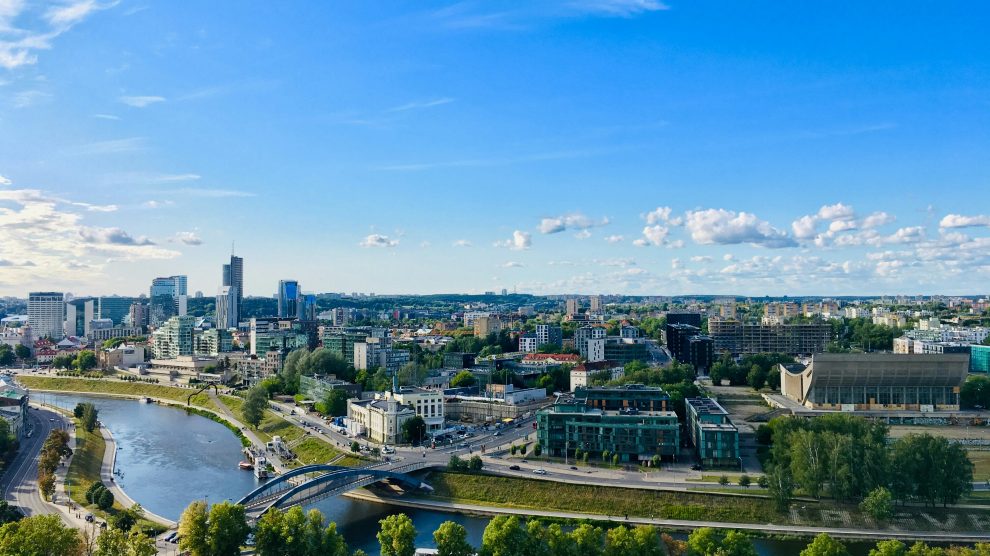Lithuania’s capital Vilnius will be the European Green Capital for 2025 as it strives to achieve climate neutrality by 2030. The city’s start-ups are contributing to its environmental protection goals, with many focusing on reducing their carbon footprint.
Cities are major polluters, generating around 75 per cent of global CO2 emissions. The year 2023 was the hottest year recorded to date, and in the face of a rapidly warming planet, large-scale efforts to reduce emissions are all the more pressing.
As the European Green Capital for 2025 and the first city in the Baltic states to join the European Bank for Reconstruction and Development (EBRD) Green Cities programme, Lithuania’s capital Vilnius is prioritising its goal to achieve climate neutrality by 2030.
The city’s cleantech ecosystem is also on a fast track to fighting the climate crisis with 10 new cleantech start-ups emerging in recent years.
- Estonia tops Future of Emerging Europe Sustainability Index
- A unique expedition to save the Baltic Sea
- ‘Venture capital in the Baltics is finally emerging as an asset class’
Vilnius is focused on upgrading its transport and energy sectors to reduce its carbon footprint: hydrgen-powered buses will soon be injected into the traffic to replace diesel-powered vehicles. The rapid modernisation of the city’s public transport is being supported by Taiwan—a country with which Lithuania has forged close ties in recent years—which will fund the acquisition of 91 new trolleybuses.
In 2022, the Lithuanian capital had the largest car-sharing ecosystem among the European capitals, with 24,000 vehicles registered per one million residents. The city’s highly functioning car-sharing system has not only reduced the number of vehicles on the road and decreased the carbon footprint but has also adapted to the demand for clean energy. Spark, a car-sharing platform, offers eco-conscious mobility solutions through electric vehicles.
Walk15 meanwhile, a Vilnius-based start-up that has become a favourite among environmentally friendly citizens, is urging people to skip the traffic and walk instead of drive. Over the last year, the app’s users took over 175 billion steps. Driving equivalent distances would have released around 22,563 tons of CO2 into the atmosphere.
Walk15 says that one kilometre covered by a car needs five trees to absorb the CO2 emitted. A feature on the app allows users to grow five virtual trees with every kilometre walked and see a real impact on the environment.
“Vilnius is a modern, active, and vibrant city, with a priority to encourage residents to step out of their cars, improve their physical well-being, and enhance their mood,” says Vlada Musvydaitė-Vilčiauskė, founder and CEO of Walk15.
“Through our app, residents as well as tourists can discover educational city routes with audio and photo points of interest. People are encouraged to cover short distances in the city on foot each day, earning step discounts for shopping in local stores. By switching to travels on foot, people are changing their daily habits, becoming more active, environmentally friendly, and public budget-friendly.”
Waste reduction as a way of cutting CO2 levels
Landfills release high levels of methane and carbon dioxide into the atmosphere, contributing to greenhouse gases worldwide. At a city level, Vilnius has created an initiative dubbed Dėk’ui (Thank You)—stations that allow people to leave their unwanted but good quality items such as clothing, furniture, books, and other household items for others to take for free. The city says that the initiative significantly reduces waste and encourages sustainable reuse.
Vinted, Lithuania’s first unicorn and the largest online consumer to consumer marketplace in Europe, is pursuing the same mission. Some 80 million of the platform’s users across Europe and North America are encouraged to prioritise second-hand items instead of buying new ones. According to Vinted, shopping for second-hand items saves CO2 while shipping through pick-up points instead of couriers has reduced emissions by 62 per cent.
Ovoko, one of the largest online business to consumer marketplaces in Europe, is also minimising the load on landfills by helping people locate and purchase used car parts.
As petrol or diesel car manufacturing typically emits around 5.6 tonnes of CO2, Ovoko increases the use of second-hand parts, reducing the need to manufacture new ones.
Photo by Reza Bina on Unsplash
Unlike many news and information platforms, Emerging Europe is free to read, and always will be. There is no paywall here. We are independent, not affiliated with nor representing any political party or business organisation. We want the very best for emerging Europe, nothing more, nothing less. Your support will help us continue to spread the word about this amazing region.
You can contribute here. Thank you.







Add Comment